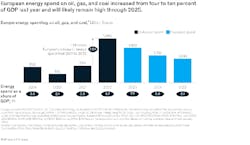McKinsey: Europe may need to reduce gas demand by 55 bcm to avoid supply risks
Failure to cut gas demand by 55 billion cu m (bcm) immediately could put Europe at substantial risk from a rebound in Asian demand or reductions in Russian imports, according to new analysis by McKinsey & Co.
In the wake of the Ukraine war, McKinsey research found that a complete cessation of imports from Russia could remove 25 bcm of supply in Europe, and a recovery in Asian LNG demand could absorb 35 bcm of supply, while a cold winter in 2023 could boost demand by 15 bcm.
The analysis shows that 57% of EU manufacturers would not be able to further reduce gas consumption while maintaining production over the next 2 years, indicating that further gas rationing measures could substantially impact the EU economy.
Even if Europe achieves the ‘RePowerEU’ goals of reducing gas consumption and improving energy efficiency in buildings and industry, gas price volatility and potential supply disruptions still pose risks to many sectors of the economy, the analysis shows. McKinsey projects that Europe may need to delay the phase-out of coal, extend the lifetime of nuclear power plants and accelerate the expansion of renewable energy sources (RES) to reduce reliance on natural gas as a baseload. It also found that ongoing supply chain disruptions, slow permitting processes and a lack of skilled labor for renewable installation could impede the required pace of RES development in Europe.
“Our analysis shows there is little bandwidth to further reduce Europe’s gas demand without substantial economic damage. If the EU achieves all its gas-savings measures this could see a 24% reduction in consumption yet other potential factors such as more competition from Asia could reduce Europe’s supply by an even greater amount," said Namit Sharma, senior partner. "The many variables at play will produce significant uncertainty and Europe’s businesses may need to prepare to mitigate these risks. This may require businesses to consider diversifying their energy sourcing and managing demand, investing in natural gas substitutes or storage and closely monitoring movements in the energy market.”
“If Europe can sustain and accelerate several gas-demand reduction measures, the market is likely to remain balanced without significant price spikes in the coming years," said Thomas Vahlenkamp, senior partner. "Europe could drive substantial gas demand reduction by accelerating industrial-electrification measures like fuel-switching and build-out of RES and through longer lifetime extensions of nuclear and coal.”
